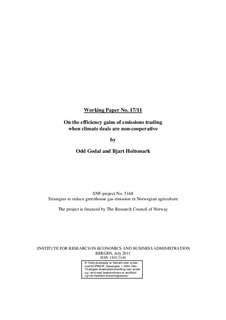| dc.contributor.author | Godal, Odd | |
| dc.contributor.author | Holtsmark, Bjart | |
| dc.date.accessioned | 2011-09-28T11:25:16Z | |
| dc.date.available | 2011-09-28T11:25:16Z | |
| dc.date.issued | 2011-07 | |
| dc.identifier.issn | 1503-2140 | |
| dc.identifier.uri | http://hdl.handle.net/11250/166418 | |
| dc.description.abstract | This paper studies, in a numerical environment, climate treaties with emissions trading when national quotas result from strategic individual choice. We find that the larger the number of parties to the deal, the smaller are the emissions reductions and the lower the welfare. If insisting on stability with respect to participation, climate treaties involve few parties and yield practically no emissions reductions. While these results contrast with some optimistic studies, our numerical example confirms established results if modelling the problem in the more traditional sense. | en |
| dc.language.iso | eng | en |
| dc.publisher | SNF | en |
| dc.relation.ispartofseries | Working paper | en |
| dc.relation.ispartofseries | 2011:17 | en |
| dc.title | On the efficiency gains of emissions trading when climate deals are non-cooperative | en |
| dc.type | Working paper | en |
| dc.subject.nsi | VDP::Samfunnsvitenskap: 200::Økonomi: 210::Samfunnsøkonomi: 212 | en |
